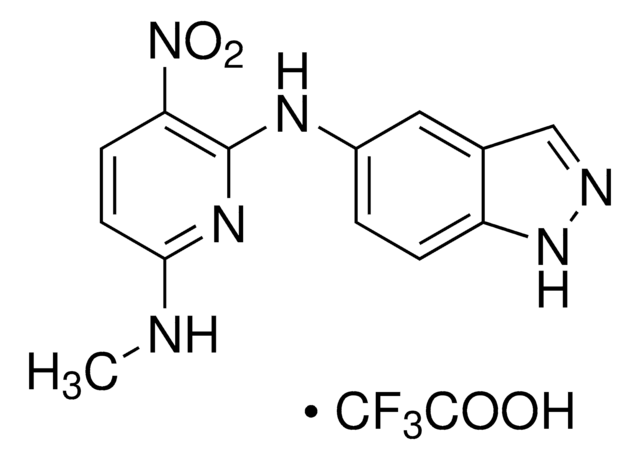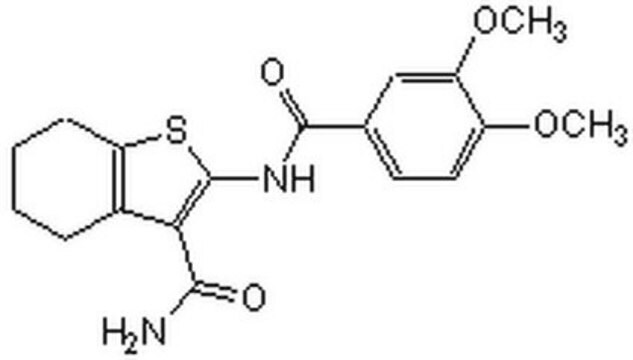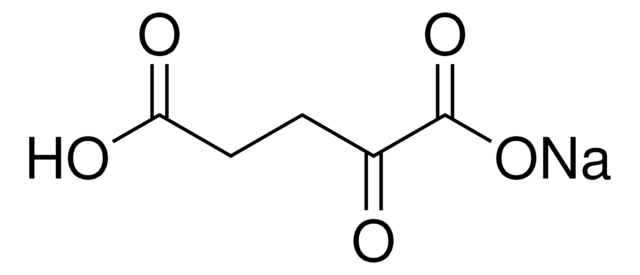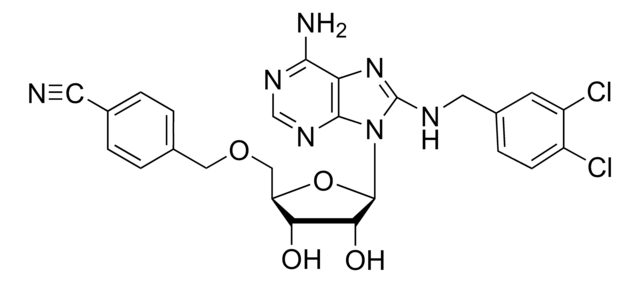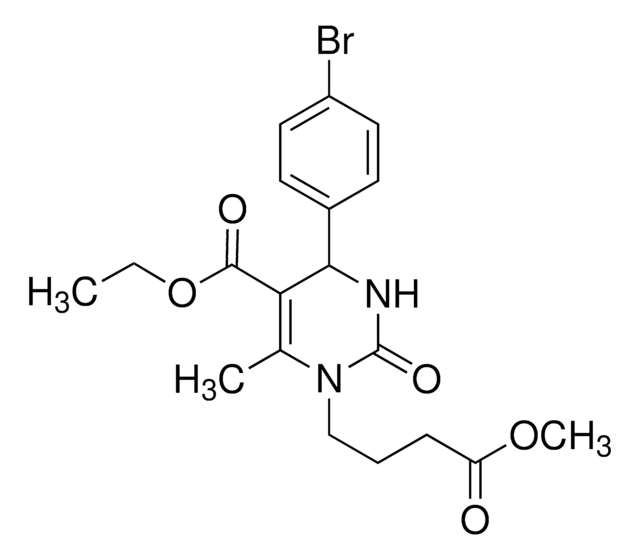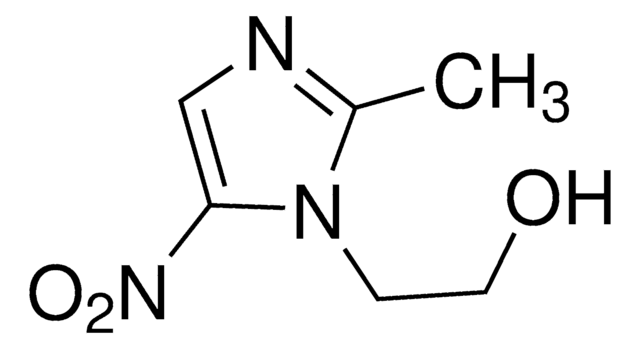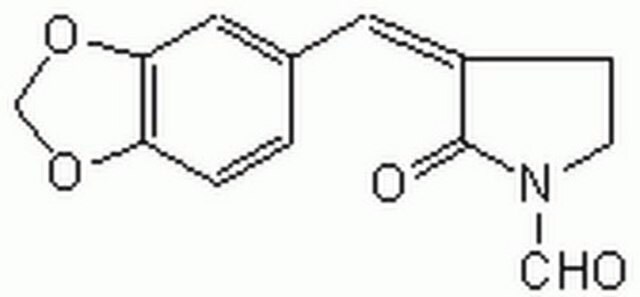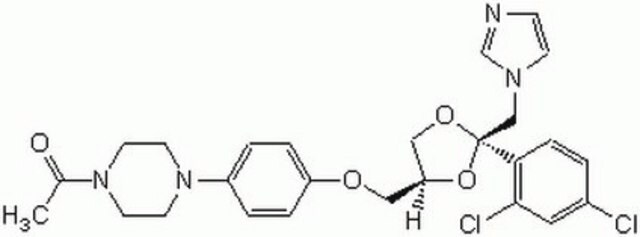385570
Heat Shock Factor 1 Inhibitor, KRIBB11
The Heat Shock Factor 1 Inhibitor, KRIBB11 controls the biological activity of Heat Shock Factor 1.
别名:
Heat Shock Factor 1 Inhibitor, KRIBB11, Hsp70 Induction Inhibitor II, N²-(1H-Indazol-5-yl)-N⁶-methyl-3-nitropyridine-2,6-diamine, HSF1 Inhibitor, KRIBB11, Heat Shock Protein Inhibitor III, p-TEFb hsp70 Promoter Recruitment Inhibitor
登录查看公司和协议定价
所有图片(2)
About This Item
推荐产品
品質等級
化驗
≥98% (HPLC)
形狀
solid
製造商/商標名
Calbiochem®
儲存條件
OK to freeze
protect from light
顏色
orange-yellow
溶解度
DMSO: 50 mg/mL, brown
運輸包裝
ambient
儲存溫度
−20°C
SMILES 字串
CNC(C=C1)=NC(NC2=CC3=C(NN=C3)C=C2)=C1[N+]([O-])=O
InChI
1S/C13H12N6O2/c1-14-12-5-4-11(19(20)21)13(17-12)16-9-2-3-10-8(6-9)7-15-18-10/h2-7H,1H3,(H,15,18)(H2,14,16,17)
一般說明
A cell-permeable 2,6-diaminopyridine compound that interacts with HSF1 (heat shock factor 1) in a reversible manner and prevents HSF1 from recruiting p-TEFb (positive transcription elongation factor b) to the hsp70 promoter site (IC50 ≤3 µM in HCT-116 ChIP assays), a critical step for the p-TEFb CDK9 subunit-catalyzed pol II CTD (RNA polymerase II c-terminal domain) Ser-2 phosphorylation and transcription activation upon heat shock induction (IC50<1, <3, <5, and <10 µM, respectively, against reporter, HSP47, HSP27, and HSP70 transcription in HCT-116 cultures). Reported to exhibit antiproliferation activity against several cancer cultures in vitro (IC50 ranges from 3 to 8 µM) and effectively suppress HCT-116-derived tumor growth in mice in vivo (by 47.4% on day 31; single i.p. dosage of 50 mg/kg on day 13 after cancer implantation). Does not affect TNF-α-induced NF-κB activity in HeLa or heat shock-induced HSF1 ser230 phosphorylation and promoter association in HCT-116 even at concentrations as high as 10 µM.
A cell-permeable 2,6-diaminopyridine compound that interacts with HSF1 in a reversible manner and prevents HSF1 from recruiting p-TEFb to the hsp70 promoter site (IC50 ≤3 µM in HCT-116 ChIP assays), a critical step for heat shock-induced transcription activation (IC50<1, <3, <5, and <10 µM, respectively, against reporter, HSP47, HSP27, and HSP70 transcription in HCT-116 cultures). Reported to exhibit antiproliferation activity against several cancer cultures in vitro (IC50 from 3 to 8 µM) and effectively suppress HCT-116-derived tumor growth in mice in vivo (50 mg/kg i.p.).
包裝
Packaged under inert gas
警告
Toxicity: Standard Handling (A)
重構
Following reconstitution, aliquot and freeze (-20°C). Stock solutions are stable for up to 6 months at -20°C.
其他說明
Yoon, Y.J., et al. 2010. J. Biol. Chem.286, 1737.
法律資訊
CALBIOCHEM is a registered trademark of Merck KGaA, Darmstadt, Germany
儲存類別代碼
11 - Combustible Solids
水污染物質分類(WGK)
WGK 3
閃點(°F)
Not applicable
閃點(°C)
Not applicable
Young Ju Yoon et al.
The Journal of biological chemistry, 286(3), 1737-1747 (2010-11-17)
Heat shock factor 1 (HSF1) is the master switch for heat shock protein (HSP) expression in eukaryotes. A synthetic chemical library was screened to identify inhibitors of HSF1 using a luciferase reporter under the control of a heat shock element.
Lea Danics et al.
Cancers, 12(9) (2020-09-16)
Modulated electro-hyperthermia (mEHT) is a complementary antitumor therapy applying capacitive radiofrequency at 13.56 MHz. Here we tested the efficiency of mEHT treatment in a BALB/c mouse isograft model using the firefly luciferase-transfected triple-negative breast cancer cell line, 4T1. Tumors inoculated
Maruhen Ad Silveira et al.
Life science alliance, 4(5) (2021-02-18)
Master transcription factors control the transcriptional program and are essential to maintain cellular functions. Among them, steroid nuclear receptors, such as the estrogen receptor α (ERα), are central to the etiology of hormone-dependent cancers which are accordingly treated with corresponding
Sara C Sebag et al.
Cell reports, 37(7), 110003-110003 (2021-11-18)
Brown adipose tissue (BAT) thermogenic activity is tightly regulated by cellular redox status, but the underlying molecular mechanisms are incompletely understood. Protein S-nitrosylation, the nitric-oxide-mediated cysteine thiol protein modification, plays important roles in cellular redox regulation. Here we show that
Greg A Timblin et al.
Nature metabolism, 3(5), 618-635 (2021-05-26)
Macrophages generate mitochondrial reactive oxygen species and mitochondrial reactive electrophilic species as antimicrobials during Toll-like receptor (TLR)-dependent inflammatory responses. Whether mitochondrial stress caused by these molecules impacts macrophage function is unknown. Here, we demonstrate that both pharmacologically driven and lipopolysaccharide
我们的科学家团队拥有各种研究领域经验,包括生命科学、材料科学、化学合成、色谱、分析及许多其他领域.
联系技术服务部门